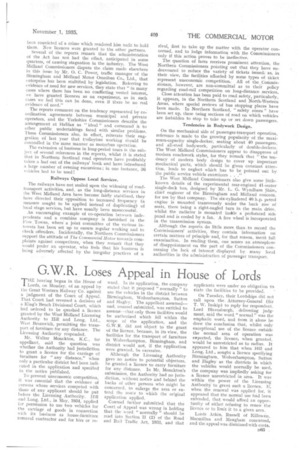G.W.R. Loses Appeal in House of Lords
Page 121

If you've noticed an error in this article please click here to report it so we can fix it.
THE hearing began in the House of Lords, on Monday, of an appeal by the Great Western Railway Co. against a judgment of the Court of Appeal. That Court had reversed a decision of a King's Bench Divisional Court, which bad ordered to be quashed a licence granted by the West Midland Licensing Authority to Hill and Long, Ltd., West Bromwich, permitting the transport of furniture for any distance. The Licensing Authority responded.
Mr. Walter Moncktou, K.C., for appellant, said the question was whether the Authority had jurisdiation to grant a licence for the carriage of furniture for " any distance," when only a particular district had been indicated in the application and specified in the notice published.
To prevent uneconomic competition, it was essential that the evidence of persons whose services competed with those of any applicant -should be put 'before the Licensing Authority. Hill and Long, Ltd., in May, 1934, applied for permission to use two vehicles for the carriage of goods in connection with its business as house-furniture removal contractor and for hire or re ward. In its application, the company stated that it proposed " normally " to use the vehicles in the district between Birmingham, Wolverhampton, Sutton and Hagley. The appellant assumed— and, counsel submitted, was entitled to assume—that only those facilities would be authorized which fell within the scope of the application, and the G.W.R. did not object to the grant of the licence, because, in its view, the facilities for the transport of furniture in Wolverhampton, Birmingham, and district would not, if the application were granted, be excessive.
Although the Licensing Authority gave no notice to potential objectors, he granted a licence to carry furniture for any distance. In Mr. Moncktonks submission, the Authority had no jurisdiction, without notice and behind the backs of other persons who might be concerned, to enlarge the area or extend the route to which the original application applied.
Counsel further submitted that the Court of Appeal was wrong in holding that the word " normally " should he read into Section II (2) of the Road and Rail Traffic Act, 1933, and that applicants were under no obligation to state the facilities to be provided. '
On Tuesday, their Lordships did not call upon the. Attorney-General (Sir T. W. Inskip) to reply for respondent. Lord Blavesburgh, delivering judgment, said the word." normal" was the emphatic word, and from it alone he drew the conclusion that, whilst only exceptional use of the licence outside the normal area of operation was expected, the licence, when granted, would be unrestricted as to radius. It appeared to him that when Hill and Long, Ltd., sought a licence specifying Birmingham, Wolverhampton, Sutton and Hagley as the districts in which the vehicles would normally be used, the company was impliedly asking for a licence unrestricted in area. It was within the power of the Licensing Authority to grant such a licence. If, when the renewal was applied. for, it appeared that the normal use had been extended, that would afford an opportunity of either, refusing to renew the licence or to limit it to a given area.
Lords Atkin, Russell of Killowen, Macmillan and l4faugliam concurred, and the appeal was dismissed with costs.
















































































































































































